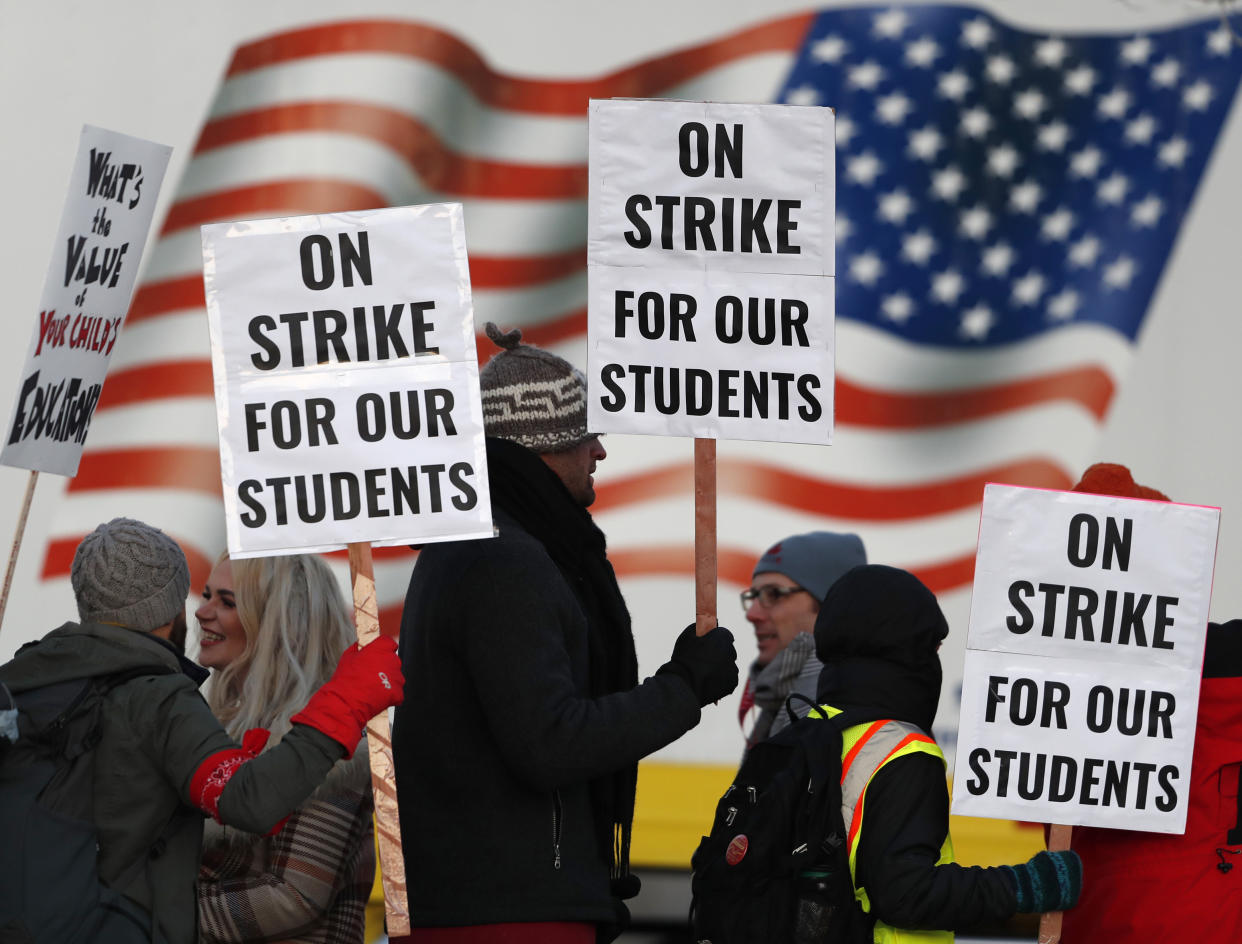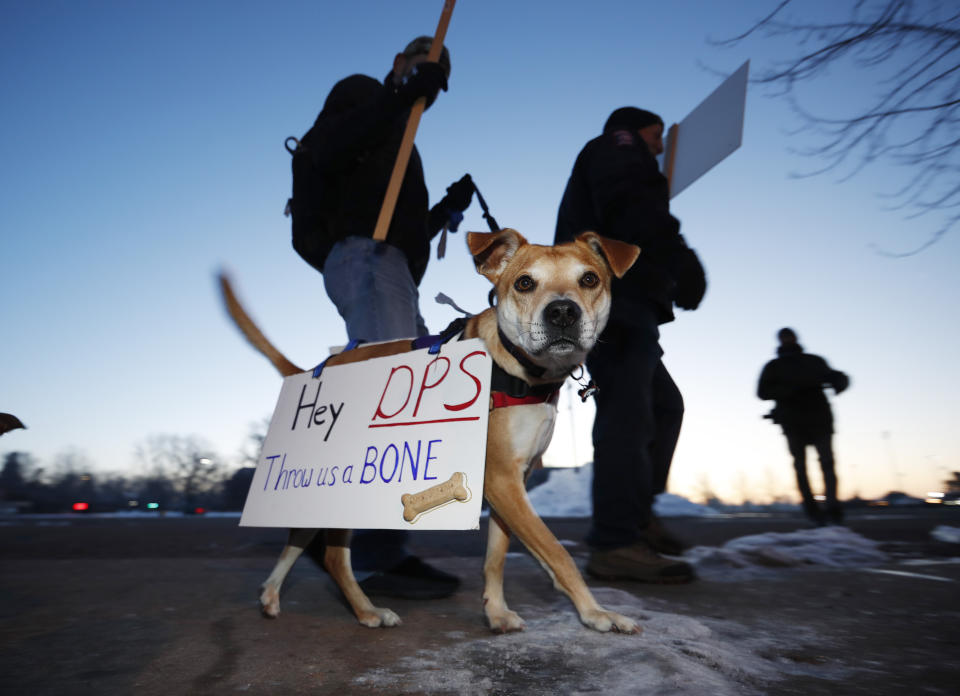As teachers in Denver demand better pay, Republicans in Washington say lack of money isn't what ails public education

WASHINGTON — In Denver, a teachers strike entered its second day. In Gary, Ind., a school has not had heating for several weeks. In San Diego, a high school senior found rat feces in his school lunch.
And in Washington, a conservative economist said that school funding was not what contributed to what is widely agreed to be the sorry state of American public education. The remarks came during a hearing of the House Committee on Education and Labor titled, tellingly, “Underpaid Teachers and Crumbling Schools: How Underfunding Public Education Shortchanges America’s Students.”
The argument that school funding was, in effect, a red herring, was proffered by the sole conservative witness at the hearing, Kennesaw State University researcher Benjamin Scafidi, who came under frequent attack from the committee’s Democrats.
Among those who took issue with Scafidi’s free-market views — in particular, that school choice is more beneficial than increased spending — was new Rep. Jahana Hayes, D-Conn., a former national teacher of the year and the first African-American woman elected to represent Connecticut in Washington. Hayes noted that of the four teacher-of-the-year finalists in 2016, three have taken part in a strike. And she flatly told Scafidi that his proposal to improve schools — and achieve racial and socioeconomic integration — by giving students and their parents greater choice over where they go to school “will not work.”
President Trump is a proponent of school choice, and during the 2016 presidential campaign promised to devote $20 billion to the measure. His education secretary, Betsy DeVos, is also a fierce proponent of school choice, though her push to deregulate schools in her native Michigan, and in Detroit in particular, has met with poor results. During his State of the Union address earlier this month, Trump said that “the time has come to pass school choice for America’s children,” though he offered no details about the plan.

That call came two weeks after teachers conducted a strike in Los Angeles, demanding better funding for their own schools and greater oversight for charter networks, generally regarded as a competitor by proponents of public education. Then, on Monday, came the strike in Denver, this one more narrowly focused on pay. In recent years, there have been teacher strikes in West Virginia, Oklahoma and Arizona, in part over frustrations with teacher accountability, student testing and the school reform movement in general.
“School reformers kind of overshot the mark, and we’re now in a pendulum swing where teachers increasingly look like good guys,” conservative education theorist Rick Hess told the New York Times last year.
The chairman of the Education and Labor Committee, Bobby Scott, D-Va., is a co-sponsor of the Rebuild America’s Schools Act, which would invest some $100 billion in American public schools through grants and credits. Scott said, in his opening remarks, that if passed into law, the bill would create 1.9 million jobs. Referencing the president’s longstanding concern with infrastructure, Scott said in his opening remarks that “school infrastructure must be part of any package we consider.” And though the Rebuild America’s Schools Act does have solid Democratic support in the House, it stands virtually no chance in a Senate that is under Republican control.
Democrats used Tuesday’s hearing to highlight just how badly a new investment in schools was needed, sometimes resorting to vivid examples to make their point. “Teachers across the country tell me all the time about having to clean up mouse droppings in the morning,” said witness Randi Weingarten, head of the American Federation of Teachers. She noted also that schools in Philadelphia are plagued by mold, while a full half of Detroit schools are in poor or unsatisfactory condition.

Republicans generally dismissed the notion that Washington could do much to help in situations like these, painting education as a matter for states and municipalities to handle. Rep. Virginia Foxx, R-N.C., cited increased spending on public schools, which she said went to “administrative bloat,” not tangible improvement. She said that on the two issues discussed in the hearing, teacher salaries and school infrastructure improvement, “Democrats have not had a new idea in decades,” and that their proposals amounted to nothing more than “more money, more bureaucracy and more power punted to distant figures in Washington.”
Foxx added that “teachers and students deserve more than the same tired fights over money.” Rep. Glenn Grothman, R-Wis., similarly said it was untenable, and unwise, to “ask this completely broken federal government for more money.”
At times, Democrats and Republicans seemed to be talking at cross purposes, broadly in agreement that schools desperately need to be fixed, but differing markedly in what they saw as the problem, or the solution. Much as progressives dislike school choice, charters will almost certainly continue to be part of any broad, nationwide approach to school changes, should such a plan ever take shape. But as the recent strikes have made clear, schoolhouse austerity is no longer palatable, even in relatively conservative states like West Virginia and Arizona.
Apparently responding to the current strike in Denver, or to the seeming radicalization of educators across the nation, the president’s son, Donald Trump Jr., said at a political rally in Texas on Monday night that “loser teachers” were “trying to sell you on socialism from birth.” He urged the crowd to resist such efforts.
_____
Read more from Yahoo News:
Ann Coulter: ‘Lunatic’ Trump could be challenged in 2020 — from the right
As Trump administration negotiates with Taliban, some retired U.S. generals see defeat
Inside a key Hawaii intelligence outpost listening in on the Pacific
As 5G war with China heats up, could a Cold War-inspired plan be the solution?



